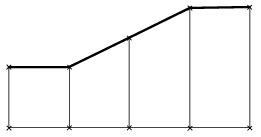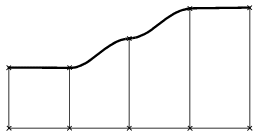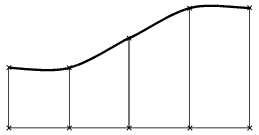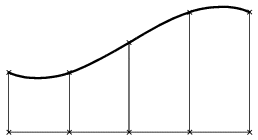The guide curve may consist of any number of connected curve segments resp. surface edges.
The profiles are aligned by means of the local coordinate system, which is defined by a moving frame. They must be connected to the guide curve at different positions. For each sequence of two profiles is computed the arithmetical mean to merge them. If a profile limitation is defined, the intermediate profiles are attached to this geometry.
-
Click the Sweep icon
 .
.
The 'Sweep' dialog box is displayed.
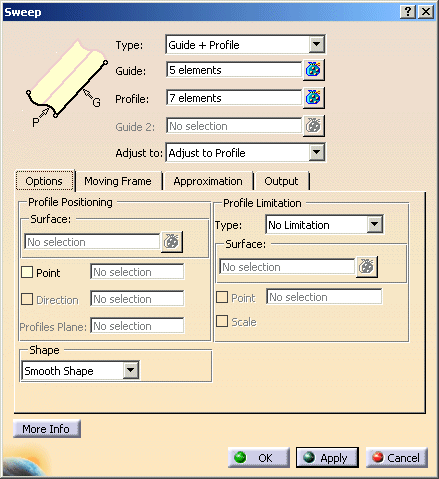
- Type: Sweep type. According to this setting, the appropriate options suitable for that specific type will be
made available.
- Multi sections: Creation of a swept surface through a number of profile curves without a guide curve.
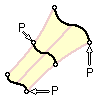
1. Type: Multi Sections
The swept surface passes through several profiles without a guide curve.
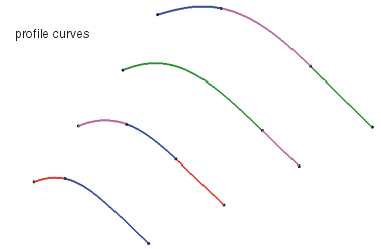
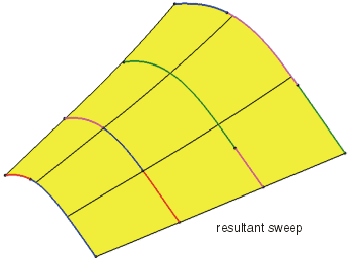
- Guide + Profile: Creation of a swept surface using guide(s) und profile curve(s).

2. Type: Guide + Profile
Profile(s) are swept along a guide curve.
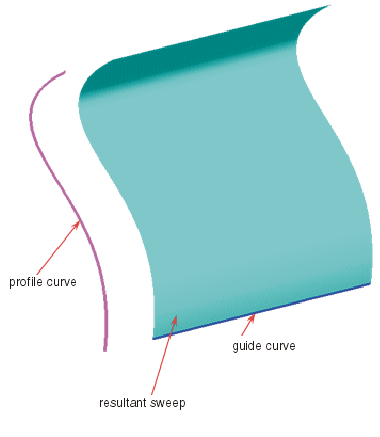
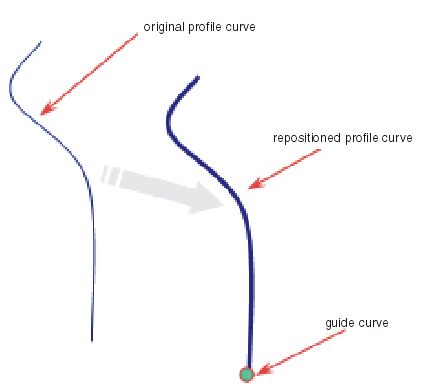

3. Type: Guide + Profile
Options:
Profile Positioning – PointA profile is repositioned along the guide curve according to the point selected on the profile.
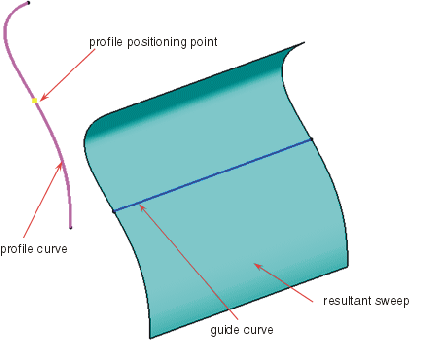
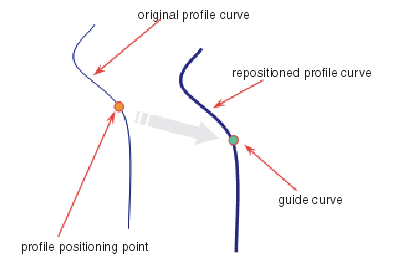

4. Type: Guide + Profile
Options:
Profile Limitation – Type: Guide 2A profile is rotated around the guide curve until it is limited by touching a 2nd Guide curve.
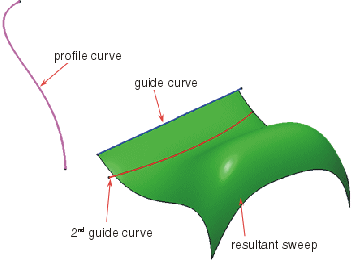
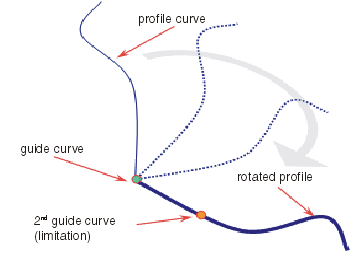

5. Type: Guide + Profile
Options:
Profile Positioning – Point
Profile Limitation – Type: Guide 2A profile is first positioned on the guide curve according to the profile positioning point. Then it is rotated around the guide curve until it is limited by touching a 2nd guide curve.
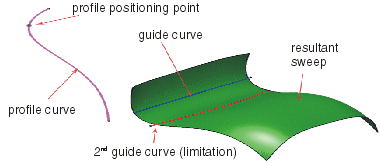
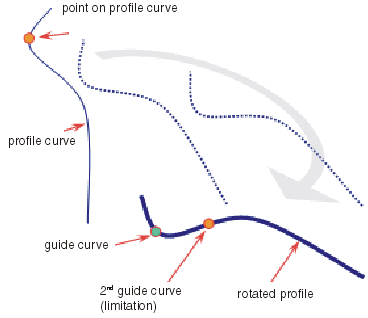
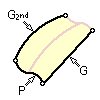
6. Type: Guide + Profile
Options:
Profile Limitation – Type: Guide 2
Profile Limitation – ScaleA profile is proportionally scaled between the guide curve and the 2nd guide curve.
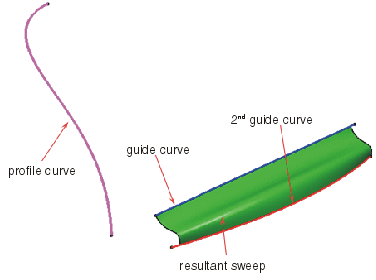
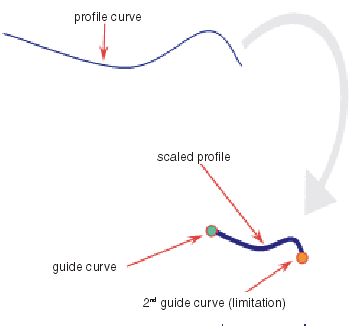
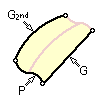
7. Type: Guide + Profile
Options:
Profile Positioning – Point
Profile Limitation – Type: Guide 2, Point, ScaleA profile is proportionally scaled between the guide curve and the 2nd guide curve using points located on the profile curve as attachment points.
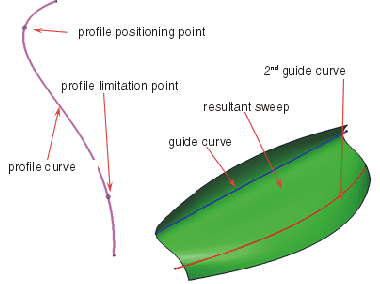
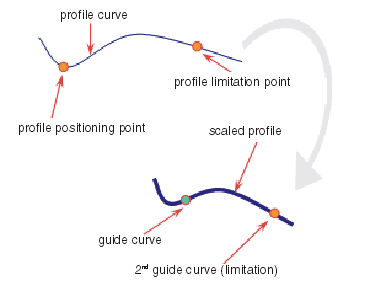

8. Type: Guide + Profile
Options:
Profile Limitation – Type: Surface TangentialA profile is rotated around the guide curve until the first tangent point on the profile comes into contact with a selected tangent surface.
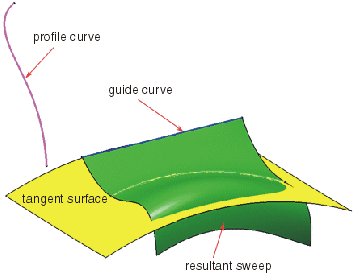
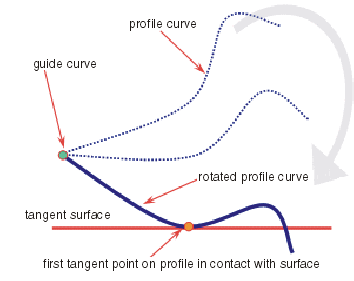

9. Type: Guide + Profile
Options:
Profile Positioning – Point
Profile Limitation – Type: Surface TangentialA profile first positioned on the guide curve according to the point selected on the profile. Then it is rotated around the guide curve until the first tangent point on the profile comes into contact with a selected tangent surface.
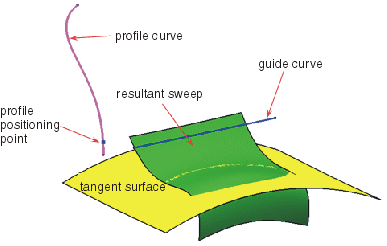
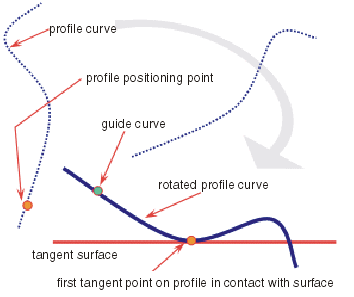

10. Type: Guide + Profile
Options:
Profile Limitation – Type: Surface PointA profile is rotated around the guide curve until its end comes into contact with a selected surface.
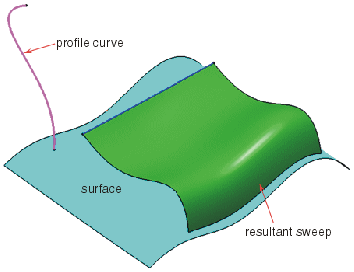
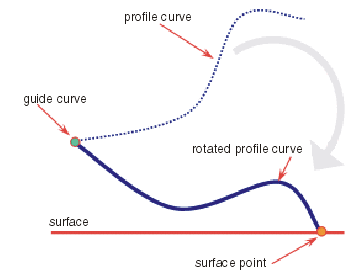
- Sliding: Creation of a swept surface using guide(s), profile curve(s), and sliding surface(s).
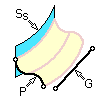
11. Type: Sliding
Options:
Profile Positioning – SurfaceA profile is positioned on a sliding surface as it is swept along the guide curve.
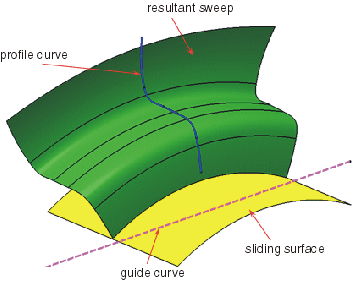
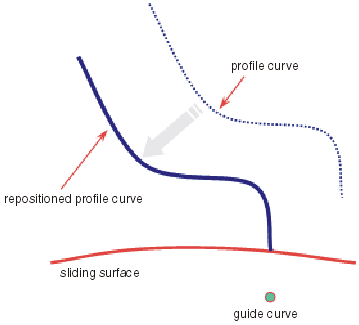
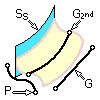
12. Type: Sliding
Options:
Profile Positioning – Surface
Profile Limitation – Type: Guide 2A profile is positioned on a sliding surface as it is swept along the guide curve using a 2nd guide curve as its limitation
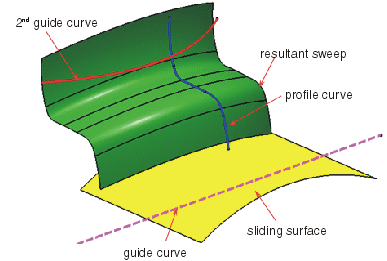
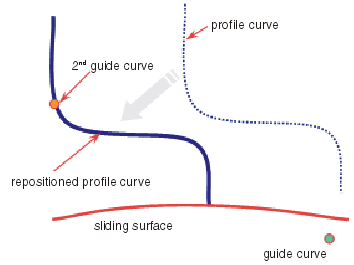
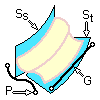
13. Type: Sliding
Options:
Profile Positioning – Surface
Profile Limitation – Type: Surface TangentialA profile is positioned on a sliding surface as it is swept along the guide curve until a tangent point on the profile curve meets the selected surface used for limitation.
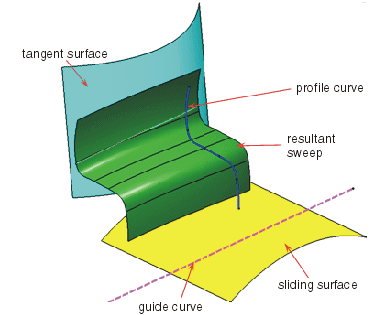
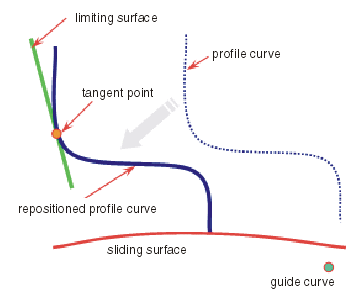
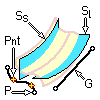
14. Type: Sliding
Options:
Profile Positioning – Surface, Point
Profile Limitation – Type: Surface Point, PointA profile is positioned using points on the profile, with the 1st point lying on the sliding surface and the 2nd lying on the selected surface used for limitation.
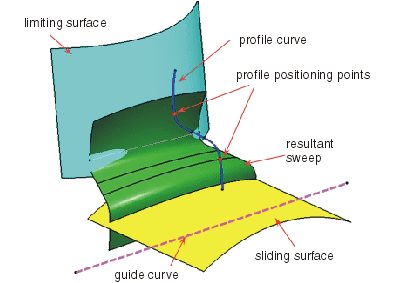
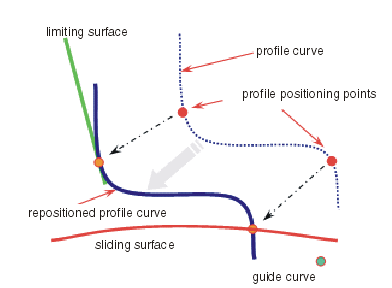
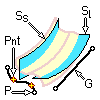
15. Type: Sliding
Options:
Profile Positioning – Surface, Point, Direction
Profile Limitation – Type: Surface Point, PointA profile is positioned using points on the profile, with the 1st point lying on the sliding surface and the 2nd lying on the selected surface used for limitation. In addition, the user can define a vector direction for the orientation of the profile.
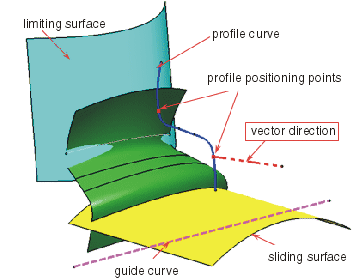
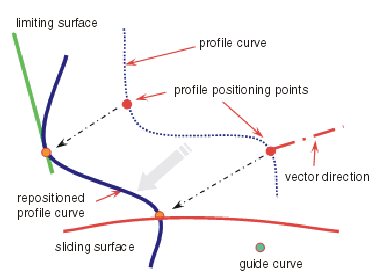
- Multi sections: Creation of a swept surface through a number of profile curves without a guide curve.
- Guide: Selection of the guide(s).
- Profile: Selection of the profile curve(s).
- Guide 2: Selection of the 2nd guide(s).
- Adjust to: If there is a gap between profile and guide, the swept surface can be created either adjusted to the guide (Adjust to Guide) or to the profile (Adjust to Profile).
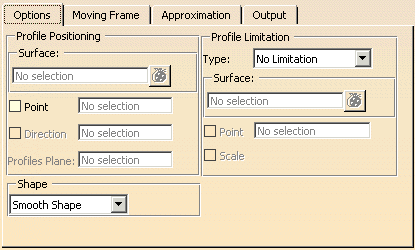
- Profile Positioning: These options can be used for positioning and adjusting the profile.
- Surface: The profile will be positioned on a sliding surface as it is swept along
the guide curve.
This option is available for the sweep type 'Sliding'. - Point: The profile is repositioned along the guide curve or sliding surface according
to a point selected on the profile.
This option is available for the sweep types 'Guide + Profile' and 'Sliding'. - Direction: The profile is aligned on the sliding surface by defining a vector direction.
This option is available for the sweep type 'Sliding'. - Profiles Plane: A reference plane can be selected for the profile alignment.
- Surface: The profile will be positioned on a sliding surface as it is swept along
the guide curve.
- Profile Limitation: The profile is rotated around the guide curve until it comes into contact with the defined
limitation.
- Type: Limitation type.
This pull-down menu is available for the sweep types 'Guide + Profile' and 'Sliding'.- No Limitation: No limitation is defined.
- Guide 2: The profile is rotated until it touches the 2nd guide curve.
- Surface Tangential: The profile is rotated until it tangentially touches the selected Surface.
- Surface Point: The profile is rotated until it touches the selected
Surface.
Option Point OFF: The profile is rotated until its end point touches the selected Surface.
Option Point ON: The profile is rotated until is touches the surface in the selected Point.
- Scale: The profile is proportionally scaled between guide and 2nd guide curve.
This option is available for the profile limitation type 'Guide 2'.
- Type: Limitation type.
- Shape (in ISD only): Specifies the shape of the surface, i. e. the transition type between the individual selected profiles.
Effect of the option 'Shape'
|
Linear Shape |
Local Shape |
|
Smooth Shape |
Global Shape |
Application Example
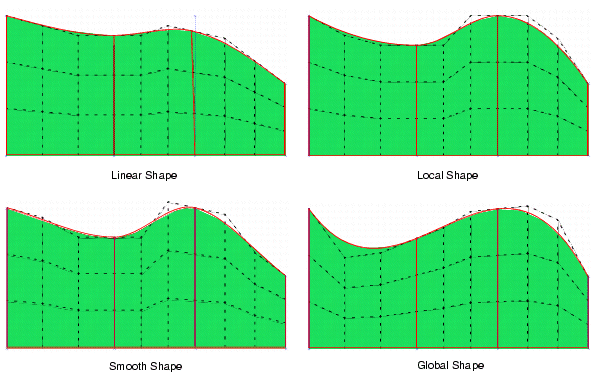

- Guide Segmentation
- Sep. Spine: The number of segments is taken by the input spine curves.
- Sep. Spine and Guide: The number of segments is taken by the input spine and guide curves.
- Sep. Spine and Guide 2: The number of segments is taken by the input spine and guide 2 curves.
- All: The number of segments is taken by the input spine, guide, and guide 2 curves.
- Profile Segmentation (in ISD only)
- First: The number of segments is taken by the first profile curve.
- Max: The number of segments is taken by the profile curve with max. segment number.
- All: The number of segments is taken by all profile curves.
- Profile Coupling (in ISD only)
- Auto: The coupling type for the profile surface segmentation is determined automatically.
- Segments: The segmentation the profile surface is determined by the segmentation of the profile curves.
- Cells: The segmentation the profile surface is determined by the cells of the profile curves.
- Bends: The segmentation of the profile surface is determined by the bends in the profile curves.
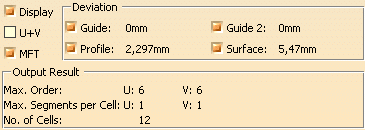
- Display: Depending on the options selected, values are displayed in the graphics area.
- Deviation: Maximum deviation of the created swept surface from the original Guide, Profile, Guide 2 (limit geometry), or Surface.
- U+V: Display of the UV vectors of curves and surfaces.
- MFT: Display of the local coordinate system for the moving frame type.
- Output Result: See Output Result
![]()
